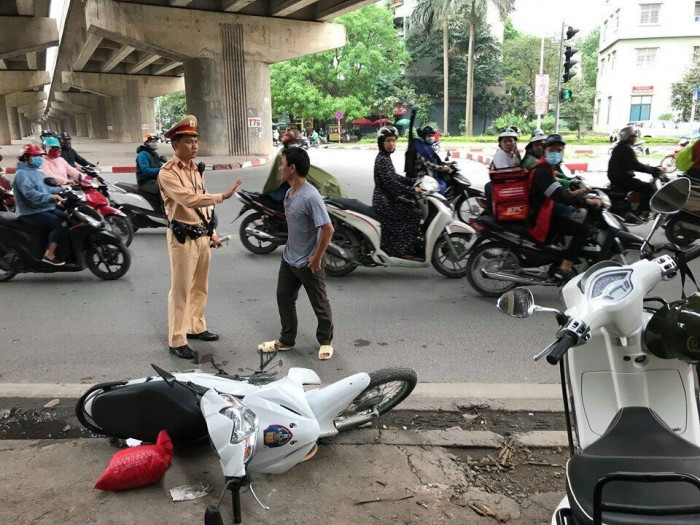Preventive Measures and Deterrents Against Actions Obstructing Public Officials on Duty: What Measures Do They Include?
What is the Act of Opposing Officials on Duty?
As stipulated in Article 3 of Decree 208/2013/ND-CP, the act of opposing officials on duty is defined as follows:
The act of opposing officials on duty is an act of using force, threatening to use force, or not complying with orders, requests of officials on duty, or other acts aiming to obstruct officials from performing their assigned tasks or compelling officials not to perform their assigned duties.
In this context, officials on duty refer to officials and public employees, officers, non-commissioned officers, and soldiers of the people’s armed forces assigned by competent agencies, organizations, or individuals to perform tasks and duties following the law and protected by the law to serve the interests of the State, people, and society.

What preventive and deterrent measures against acts of opposing officials on duty include?
What are the Preventive Measures Against Acts of Opposing Officials on Duty?
The preventive measures against acts of opposing officials on duty include measures stipulated from Article 8 to Article 13 of Decree 208/2013/ND-CP as follows:
(1) Publicizing and educating laws on preventing, deterring, and handling acts of opposing officials on duty
Agencies, organizations, and local authorities are responsible for publicizing and educating laws on citizens' rights and obligations, the functions, tasks, and authority of law enforcement forces to enhance legal understanding and compliance for citizens and members of agencies, organizations, and local areas.
(2) Developing and implementing plans, procedures, regulations, and work plans
- Based on their functions, tasks, and authority, agencies, organizations, and law enforcement forces are responsible for developing and implementing specific plans, procedures, regulations, and work plans for each field, area, and subject; these plans, procedures, regulations, and work plans must anticipate possible situations and measures, methods, and procedures to solve them.
- During task execution, officials on duty must strictly follow the plans, procedures, regulations, and work plans approved by competent authorities; maintain proper etiquette, discipline, and work style.
(3) Training, fostering professional skills, and professional ethics
Within their functions, tasks, and authority, agencies and organizations are responsible for developing and implementing training programs, fostering and enhancing professional skills, professional ethics, methods of persuasion, weapon use skills, support tools, specialized technical equipment, legitimate self-defense skills, and handling situations when there are acts of opposing officials on duty; training proper etiquette, demeanor, and attitude for officials on duty while performing tasks.
(4) Patrolling, controlling, and protecting areas in accordance with the law
Within their functions and tasks, the police, military, forest rangers, customs, and other law enforcement units and organizations are responsible for organizing patrols, control within their management authority.
When conducting patrol and control activities, law enforcement forces must use correct uniforms and equipped means, except as otherwise provided by law; comply with processes, procedures, plans, work procedures approved by competent authorities.
(5) Inspecting, handling legal violations by officials on duty
Agencies and organizations managing officials on duty are responsible for developing and implementing plans, measures to enhance work efficiency, preventing, preventing legal violations by law enforcement forces.
Regularly inspect, correct task performance and legal compliance, promptly detect and strictly handle all legal violations by officials on duty.
(6) Informing the residence locality or the agency, organization where the person opposing officials on duty studies or works
After handling violations by individuals opposing officials on duty, the agency that issued the violation handling decision is responsible for sending a written notice to the local authority where the individual resides or the agency, organization where the individual studies or works to take preventive and managerial measures.
The informing document of the agency that issued the violation handling decision for the person opposing officials on duty must specify the name, address, occupation of the violator; the violation act, the form, the violation handling measure for the person opposing officials on duty.
What are the Deterrent Measures Against Acts of Opposing Officials on Duty?
As stipulated in Article 14 of Decree 208/2013/ND-CP, the content is regulated as follows:
- Explain to the violator that they are breaking the law and request an immediate cessation of that violation. Require the violator to present their identification card and other necessary documents for inspection.
- Enforce the violator to cease the law-breaking act and comply with officials' orders and requests.
- Arrest individuals opposing officials on duty; search the person, the violating means; seize and neutralize dangerous weapons, explosives, support tools.
The procedures for arresting, searching individuals opposing officials on duty, and searching violating means are carried out according to the laws.
- In cases of mass opposition to officials on duty, apply methods to persuade and convince the violators to stop the violations; if necessary, enforce measures as per laws on maintaining public order to disperse the crowd; prevent, isolate, control, and arrest instigators and organizers.
- In necessary or urgent cases, or when the violator uses military weapons or simple weapons to attack officials on duty, depending on the nature and level of violation and the specific case, officials on duty are permitted to use force, support tools, and technical devices or fire weapons for legitimate self-defense, attacking, controlling, and detaining the person opposing officials on duty.
The use of firearms during duty performance is implemented following Article 22 of Law on Management and Use of Weapons, Explosives, and Support Tools 2017 and other related legal provisions.
- Handling individuals opposing officials on duty is done following the laws on handling administrative violations and criminal law, and criminal procedure law.
For cases of opposing officials on duty, it is proposed that the competent Court increase mobile trials to contribute to general prevention and education.
LawNet